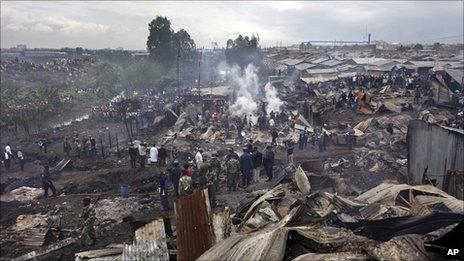Nairobi anger high after deadly pipeline fire
- Published

Charred bodies lay scattered in the densely populated Sinai slum in Kenya's capital, Nairobi. Many were burnt beyond recognition by Monday's huge petrol fire.
In some cases, it was difficult to distinguish the gender of victims. All we could see were skulls and bones - the smaller ones of children.
People on fire had run towards a sewage-filled river, hoping to dive into it to douse the flames - their bodies were floating in the water.
Several other bodies lay on top of each other on the river bank, apparently these were of people who tripped over each other as they fled.
Firefighter Boniface Ruto told BBC Africa how the fire spread in the slum.
Residents said the river also caught fire as fuel leaked into it. A colleague told me he had seen smoke hanging over the water.
Survivors sobbed as they walked through the explosion site: one man found the body of his child, still smouldering. Other people just stared, as they tried to come to terms with their loss.
And yet others dialled the mobile phones of loved ones, hoping to hear their voice.
'Ball of flame'
Sinai is a poor and densely populated slum. Homes are built with corrugated iron, dozens of them had been razed to the ground in the inferno.
Some people walked through the rubble to assess the damage. Everything had turned into ash - from clothes to mattresses.
The fire swept through the slum.
Maurice Odhiambo Makoloo: The residents can successfully sue for the loss of life
"I heard a loud explosion. Then I saw a ball of flame. All around me there was a fire," one woman told me.
There are no proper roads in Sinai - only narrow, twisting alleyways. This hampered relief efforts, as policemen and firemen battled to gain access to the explosion site.
Survivors were taken to Nairobi's Kenyatta hospital.
There, the scene was chaotic, as nurses and doctors rushed from patient to patient. They called for blood donors to come forward, and threw cooling blankets around victims of the explosion.
Most survivors had burns covering more than 30% of their bodies. Their skin had peeled off, hanging from their bodies.
Families and friends gathered at the hospital, anxious for news about their loved ones.
Anger is running high in Sinai. People blame the sate-owned Kenya Pipeline Company (KPC) for the explosion.
The company's offices are near the slum and its managers tried to hold a press conference to explain what happened.
They were shouted down by an angry crowd and forced to abandon the press conference.
"You killed my family," one man shouted.
Kenya's Prime Minister Raila Odinga visited the hospital as well as the site of the explosion. He described it as the worst incident to hit Kenya's oil sector - and promised compensation to survivors.
Mr Odinga has promised an investigation to identify the cause of the explosion. For the slum-dwellers though, the reason is obvious: Poverty.
People were scooping fuel from the leaking pipeline when the explosion happened. They would not have been doing that if Sinai was a well-built area and its residents had decent jobs.
- Published12 September 2011
- Published12 September 2011
- Published12 September 2011